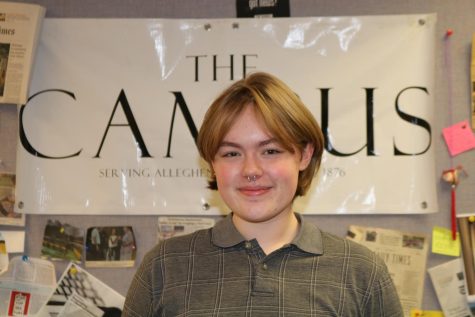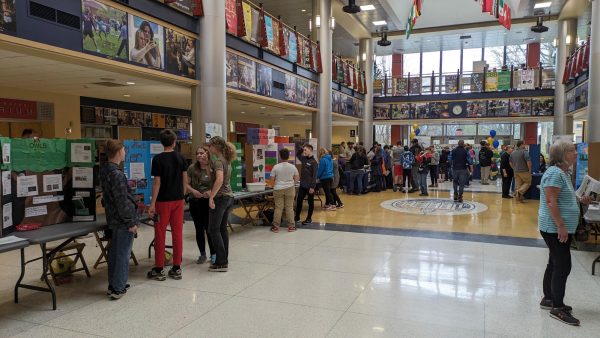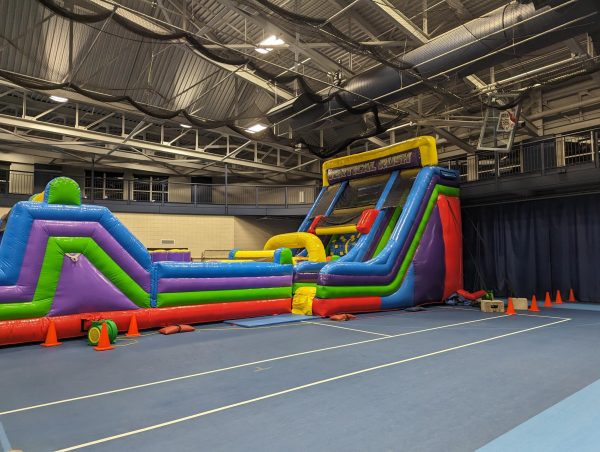Despite low turnout, ‘Speak About It’ goes on
No one wants to speak about it.
Music blared over the stereo for sound checks, audience questions were being finalized and “wanna be an ACTIVE BYSTANDER?” was written on the green chalkboard at the bottom of the lecture space. But aside from an event coordinator from “Why Not Us?” and myself, reporting for The Campus, the 100-plus seats of the Quigley Auditorium remained bare; there was no voluntary audience to speak to.
The educational theater program “Speak About It” was set to take the stage at 7 p.m. on April 19 to teach students about the importance of active bystanding and sexual assault prevention. Led by Speak About It’s Creative Director Leo Mock and actor Abby Weissman, Wednesday’s program was a collaboration with Title IX and the club “Why Not Us?” intended to help students practice the skills they could use as an active bystander.
“People forget that it’s like a skill that needs to be practiced and will likely feel awkward and kinda funky at first, but with time feels better,” Mock said.
Mock and Weismann opened the presentation by setting some ground rules. Among them were “what’s said here, stays here,” and “don’t yuck a yum,” both of which established a judgment-free zone from the start in an attempt to foster open conversation.
“This is a tool that we use just to make sure that we are setting a space of intentions and we’re all on the same page as we move into discussions that can be a little bit more sensitive or vulnerable for some people,” Weissman explained.
Then came a group conversation on various words and their definitions. “Power,” “active bystander” and “identity” were the three terms opened to our interpretation. This kind of fluid conversation with no right or wrong answer is something that Mock emphasized as a core feature of the Speak About It programs.
“(This) is one of the most discussion-based programs we’ve made so far, one of the most interactive,” he said. “We’re finding more and more what people want is to have a chance to speak and share their thoughts, rather than just having us come and talk at them.”
Throughout the presentation, Mock and Weismann opened the floor to audience input — even if there were only two voices in the rows of seats. One chance for audience input followed a clip from the movie “Hitch,” wherein Will Smith’s character is a successful active bystander, but whose motives were questionable.
The clip showed Smith’s character approach a woman and pretend to be her boyfriend to ward off an unwanted advance by another man. Smith’s character then flirted with that woman.
“In an ideal world, like in a vacuum, it would be awesome if he didn’t have an ulterior motive in stepping in,” Weissman said. “Part of why I really liked the example that we showed is because people will have ulterior motives … we exist in relationship to people.”
This conversation on motives led to further conversation on various bystander tactics. Some of the tactics listed included producing a distraction, asking for a favor from the person you think is in harm or coming up with a pre-determined code with friends before stepping into a potentially uncomfortable situation.
These various tactics are part of why Speak About It was invited back to campus in the first place, according to Title IX Coordinator Gilly Ford.
“I hope that students walk away with more information, knowledge and hopefully skills that if they found themselves in a situation that they weren’t quite sure what to do but felt like they needed or wanted to intervene, then they’ll be better equipped to do that,” Ford said.
Lyndsey Robinson, ’24 — the only other audience member present and the incoming president of “Why Not Us?” — felt that the skills covered in Speak About It’s presentation should be covered throughout the year. While Speak About It was implemented in a video presentation format for 2022 first-year orientation, Robinson thinks that spreading awareness should not stop at a mandatory meeting.
“We brought up the fact (to Ford) that a lot of people didn’t pay attention to the intro seminar during the first year (orientation),” Robinson said. “Why would they?”
Though she was disappointed by the lack of turnout, Robinson said she was not surprised given the timing, and acknowledged that Speak About It will be implemented more frequently in the future, giving students more chances to participate.
“I think this week was kind of a bad week to have everything,” she said. “I know a lot of students on campus were swamped with presentations because finals are happening. I think that we (Why Not Us?) will have a better turnout next semester because we’re already starting to figure out what talk that we want to have.”
The low turnout did not dissuade Weissman either, who commented that she has shown up to events with a turnout of zero. It’s important to remember that a few students can cause a ripple of change, especially on a small campus, she explained.
“If we can give people the tools to have conversations amongst themselves once we’re gone, then that’s really where the lasting impact lies,” Weissman said. “The impact of those few students can ripple out onto the campus whether everyone’s there or not.”

Sam Heilmann is a sophomore from Johnstown, PA. She is double-majoring in Communications and Environmental Science and Sustainability. This is her second...






